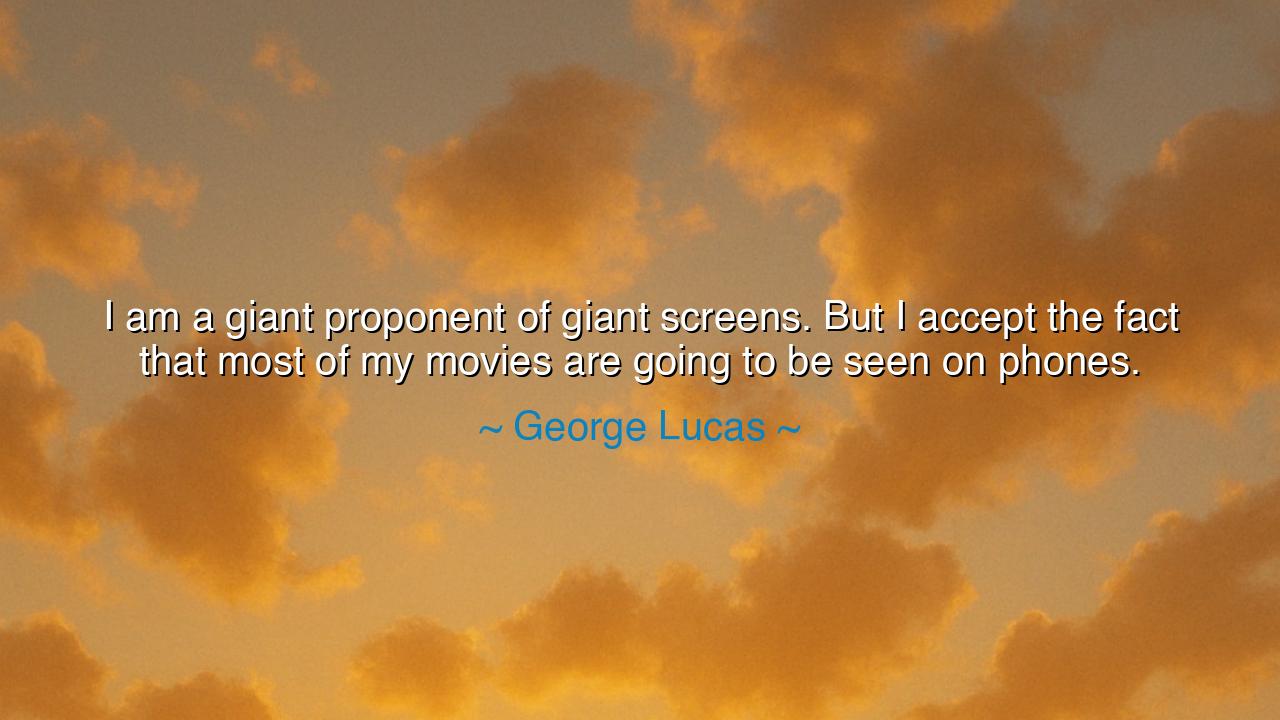
I am a giant proponent of giant screens. But I accept the fact
I am a giant proponent of giant screens. But I accept the fact that most of my movies are going to be seen on phones.






In the course of human history, there has always been a tension between tradition and progress, between the grandeur of the past and the ever-evolving demands of the present. George Lucas, the visionary behind the Star Wars saga, in his statement, "I am a giant proponent of giant screens. But I accept the fact that most of my movies are going to be seen on phones," encapsulates the profound shift in the way we experience art, culture, and technology. The giant screen—once the epitome of cinematic experience—is now being replaced by the palm-sized screens of our digital age. Lucas’ words reflect a deeper understanding of the inevitable march of progress and the adaptation required in a world where technology is constantly reshaping the way we engage with the world.
The story of the cinema itself is a testament to humanity’s desire to see the world from a different perspective. In the early days of film, the notion of projecting moving images onto a screen was as miraculous as any mythic tale. Early pioneers like Thomas Edison and the Lumière brothers unlocked a new form of storytelling, one that allowed people to experience stories not just through words or paintings, but through the power of motion and visuals. The cinema, as we know it, was born from a desire to create immense experiences, to capture the grandeur of the human experience on a larger-than-life scale. Theaters filled with giant screens offered a shared experience—a collective moment where individuals could witness the epic unfold before them.
Yet, as with all things in the human journey, the era of the giant screen has given way to the modern age of individual consumption. Smartphones, those small, personal windows to the world, have revolutionized the way we engage with media. Just as the printing press once threatened the power of oral tradition by enabling the mass production of books, so too has the smartphone democratized access to films and media. In this world of rapid technological change, Lucas’ acceptance of this new reality is not a defeat, but a recognition of the transformation of the times. Films that were once intended to be experienced in large, communal spaces are now viewed in the quiet of one’s hand, in the solitude of one’s own thoughts. It is a shift from collective to individual experience.
The shift from cinema’s giant screens to the small screens of phones may seem like a loss of immersion—the shared, larger-than-life experience of watching a movie in a grand theater. Yet, the story of human progress has always been one of adapting to new ways of seeing and experiencing the world. The great philosophers of ancient Greece often spoke of the necessity of adapting one’s mind to the circumstances at hand. Socrates famously said, “The unexamined life is not worth living,” a reminder that we must constantly examine and adjust our perceptions in light of new technologies and new ways of engaging with the world. Lucas, in his own way, embraces this philosophy: cinema, as an art form, must evolve to meet the changing needs and circumstances of its audience, even if that means shifting from the grandeur of the theater to the intimacy of the phone.
This shift from the giant screen to the mobile screen mirrors a broader cultural transformation. Throughout history, art and storytelling have continuously adapted to the tools and media available. The Greeks performed their plays in massive open-air theaters, creating larger-than-life performances for an audience of thousands. But by the time of Shakespeare, theater had become more intimate, performed in smaller, more personal spaces that still carried the power to move the hearts of those who attended. Similarly, the digital age has brought intimate access to the stories we once shared as a collective. Lucas’ recognition of this shift is both a nod to the power of technology and a realization that the nature of storytelling is no longer confined to the grand spectacle, but rather is now woven into the fabric of everyday life.
The lesson we can glean from Lucas’ acceptance is a lesson in adaptation and acceptance. Just as the ancient artists and thinkers adapted to the changes of their time, we must also adapt to the technological advances that shape our world. We must not bemoan the loss of what was, but embrace what can be. The phone, once seen merely as a tool for communication, has become a device for learning, for creating, and for experiencing the vast stories of the world. Rather than clinging to the grandiosity of past forms, we must embrace the new methods by which we connect with each other and the stories that bind us together.
Thus, the call to action is clear: as we move forward into a world where the small screen often dictates our interaction with the big stories, we must not mourn the loss of the past but embrace the new frontiers that technology offers. Let us recognize that the essence of art and storytelling lies not in the medium, but in the human connection it fosters, whether it is shared in a theater or viewed on a phone screen. The power of a story does not reside in its size, but in its ability to move and transform those who experience it, no matter how it is delivered. In this new world, the giant screen may have become a relic, but the stories that we share remain as powerful as ever.






AAdministratorAdministrator
Welcome, honored guests. Please leave a comment, we will respond soon